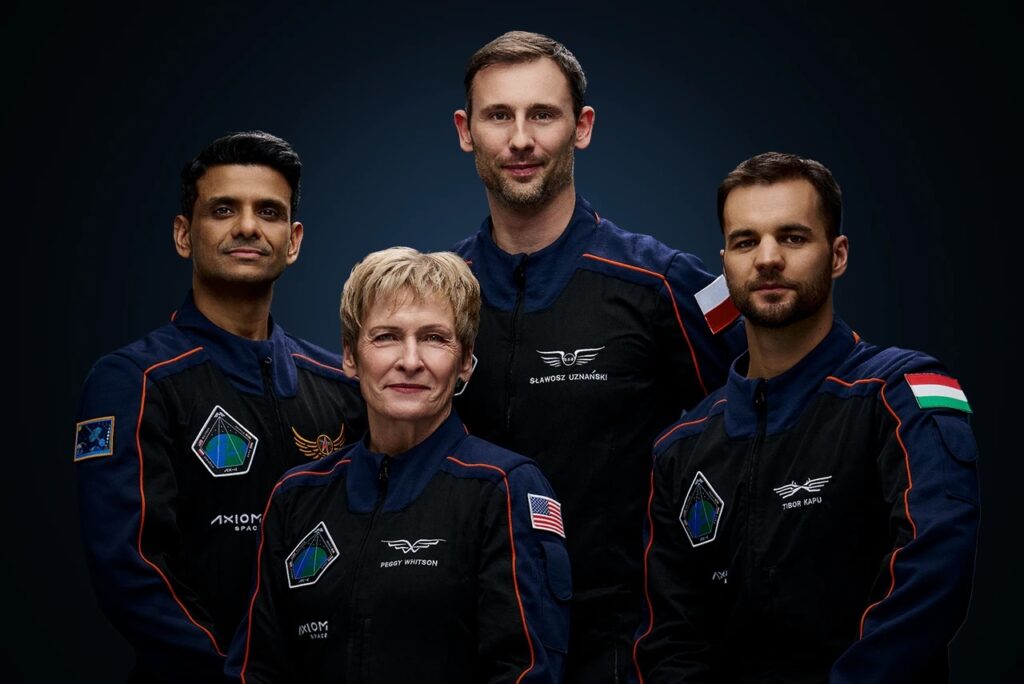Introduction
On June 25, 2025, Axiom Mission 4 launched successfully to the International Space Station (ISS) — making history in more ways than one. It included astronauts from India, Poland, and Hungary, along with veteran NASA commander Peggy Whitson. But beyond the headlines lies a deeper question: Are private space missions like Axiom the future of space exploration?
Context
Axiom Space is a US-based private space company conducting commercial missions to the ISS. Ax-4 made headlines not just for launching an international civilian crew, but also because Indian astronaut Shubhanshu Shukla participated — the first Indian in space since Rakesh Sharma (1984). PM Modi even interacted live with him from Earth.
The mission also involved experiments like growing methi and moong in space, testing tardigrades, and celebrating with champagne in zero gravity. This raises a powerful GD debate: Can private space companies like Axiom really lead humanity’s next chapter in space?
Arguments in Favour (YES – Private Space is the Future)
Faster innovation and flexibility:
Private companies like SpaceX, Axiom, and Blue Origin operate with more freedom, allowing them to innovate quickly and test bold new ideas.
Boosts global access to space:
Countries without space agencies — like Hungary and Poland — can now send astronauts through private collaborations like Axiom Mission 4.
Cost-effective and reusable tech:
Private space firms focus on reducing costs by reusing rockets and optimizing logistics, making space more affordable and scalable.
Drives scientific research and education:
Private missions carry student experiments, biotech payloads, and R&D projects, expanding the role of space in industry and academics.
Inspires public-private partnerships:
Private companies are working alongside NASA, ISRO, and ESA — creating win-win collaborations that benefit all stakeholders.
Encourages space tourism industry:
With reusable crafts and tested launch systems, space travel is now within reach of civilians, opening a new tourism sector.
Attracts global talent and investment:
Private space companies attract engineers, scientists, and investors globally, fueling a high-growth industry with massive potential.
Fuels STEM enthusiasm in youth:
Missions like Ax-4, especially with astronauts like India’s Shubhanshu Shukla, inspire millions of students to dream big in science and tech.
Diversifies mission goals:
Beyond satellites and astronauts, private firms launch space factories, telescopes, and even lunar delivery missions.
Reduces burden on taxpayers:
Government agencies can focus on deep-space exploration while private firms handle commercial launches — saving public funds.

Also Read: Is Starlink a Game‑Change?
Arguments Against (NO – Space should remain government-led)
Risk of commercialization over science
Private missions may prioritize space tourism or brand deals over scientific advancement.
Limited regulation and safety concerns
Without strict international rules, private companies may cut corners or create legal/ethical risks in orbit.
Inequality in access
Only the rich or privileged may get access to these missions, leaving out deserving talent.
Loss of national sovereignty
When private firms take the lead, countries may lose control over their space policy or data.
Environmental impact of frequent launches
Rocket launches produce emissions — more private missions could harm the environment if unchecked.
Balanced Conclusion
Private space missions like Axiom Mission 4 represent a new era in human spaceflight — one driven by innovation, collaboration, and global ambition. But while they offer exciting opportunities, strong regulation and inclusive access are essential to ensure that space remains a resource for all humanity, not just the elite.
Quick Summary
- Axiom Mission 4 marked India’s return to space through a private mission
- Private space is fast, efficient, and globally inclusive
- But also needs regulation, ethics, and public interest focus
FAQs
Q1. Who is Shubhanshu Shukla?
An Indian astronaut on Ax‑4, representing India in space after 41 years. He conducted key science experiments and interacted live with PM Modi from ISS.
Q2. What makes Axiom Mission 4 historic?
It included astronauts from India, Hungary, Poland — marking their return to space after decades. It also featured student-focused STEM experiments and cultural milestones like the first champagne pop in space.
Q3. Is India collaborating with Axiom Space?
Yes. There are early signs of partnerships with Indian companies like Skyroot Aerospace, and Indian astronauts participating in future missions.

